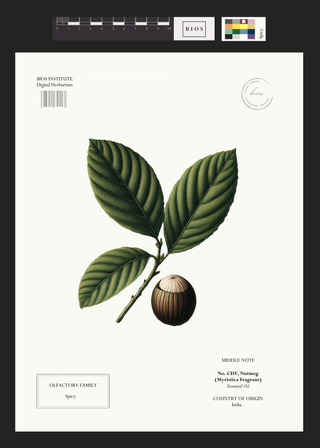

Myristica fragrans, commonly known as nutmeg, is native to the Banda Islands in the Moluccas (Maluku) region of Indonesia. The Banda Islands are also known as the Spice Islands because of their historical significance as the source of valuable spices like nutmeg and mace.
Nutmeg is a tropical evergreen tree belonging to the Myristicaceae family. It produces two valuable spices: nutmeg, which is the seed found inside the fruit, and mace, which is the reddish aril that covers the seed. Both nutmeg and mace have been highly prized throughout history for their culinary and medicinal uses.
From its native range in the Banda Islands, nutmeg cultivation and trade spread to other parts of the world, including India, where we source our from, Sri Lanka, the Caribbean, and other tropical regions.
Nutmeg has a warm, spicy, and aromatic scent with sweet, woody, and slightly floral undertones. Its aroma is characterized by a combination of sweetness and spiciness, making it a popular choice in perfumery for adding depth, warmth, and complexity to fragrance compositions.
In perfumery, nutmeg is a Middle note found in our Spicy family. Nutmeg contributes to the heart of a fragrance, providing warmth, richness, and a spicy character.
Nutmeg is commonly used as a component in both masculine and feminine fragrances. It blends well with a variety of other fragrance ingredients, including citrus notes, floral notes, woods, spices, and resins. It adds a touch of warmth and complexity to perfume compositions, enhancing their overall olfactory profile.
Nutmeg played a significant role in the history of spice trade. During the Age of Exploration, nutmeg was highly sought-after and had great economic value. It was traded by European explorers and merchants, leading to the colonization and establishment of spice routes in Asia, particularly in the Moluccas (known as the "Spice Islands").
Nutmeg is widely used as a spice in numerous cuisines around the world. It adds a warm and aromatic flavor to dishes and is commonly used in both savory and sweet recipes. Nutmeg is a staple in holiday baking, such as in cakes, cookies, and pies. It is also used in savory dishes like soups, stews, and sauces.
Nutmeg has been used in traditional medicine systems for its potential health benefits. It is believed to have digestive, anti-inflammatory, and antimicrobial properties. In some cultures, nutmeg is used to alleviate digestive issues, reduce pain, and promote overall well-being. However, it's important to note that nutmeg should be used in moderation as excessive consumption can have adverse effects.
In certain cultures, nutmeg holds symbolic meanings and is associated with various beliefs and customs. It may be used as a talisman or included in rituals for good luck, protection, or to ward off negative energies. In some folklore and folk traditions, nutmeg is believed to have mystical or magical properties.
Nutmeg is also used in perfumery and aromatherapy due to its aromatic qualities. The warm and spicy scent of nutmeg is used in fragrances and essential oils, often in combination with other aromatic ingredients.
The cultural significance of nutmeg can vary across different regions and communities. It may hold additional meanings and associations specific to local customs, rituals, and folklore.
Nutmeg
- Unit price
- /per
Please note this product format is a small vial that contains roughly 20 drops of scent concentrate. This can be purchased à la carte but is intended to be used with our Perfume Kit.
SCENT SPECIFICATIONS
Latin Name: Myristica Fragrans
Extraction Method: Steam Distilled
Country of Origin: India
All of the scents in our library are naturally derived - our collection includes essential oils, absolutes, concretes, isolates, enfleurage, macerations, oleoresins, and mixed medium naturals.
Adding product to your cart
Myristica fragrans, commonly known as nutmeg, is native to the Banda Islands in the Moluccas (Maluku) region of Indonesia. The Banda Islands are also known as the Spice Islands because of their historical significance as the source of valuable spices like nutmeg and mace.
Nutmeg is a tropical evergreen tree belonging to the Myristicaceae family. It produces two valuable spices: nutmeg, which is the seed found inside the fruit, and mace, which is the reddish aril that covers the seed. Both nutmeg and mace have been highly prized throughout history for their culinary and medicinal uses.
From its native range in the Banda Islands, nutmeg cultivation and trade spread to other parts of the world, including India, where we source our from, Sri Lanka, the Caribbean, and other tropical regions.
Nutmeg has a warm, spicy, and aromatic scent with sweet, woody, and slightly floral undertones. Its aroma is characterized by a combination of sweetness and spiciness, making it a popular choice in perfumery for adding depth, warmth, and complexity to fragrance compositions.
In perfumery, nutmeg is a Middle note found in our Spicy family. Nutmeg contributes to the heart of a fragrance, providing warmth, richness, and a spicy character.
Nutmeg is commonly used as a component in both masculine and feminine fragrances. It blends well with a variety of other fragrance ingredients, including citrus notes, floral notes, woods, spices, and resins. It adds a touch of warmth and complexity to perfume compositions, enhancing their overall olfactory profile.
Nutmeg played a significant role in the history of spice trade. During the Age of Exploration, nutmeg was highly sought-after and had great economic value. It was traded by European explorers and merchants, leading to the colonization and establishment of spice routes in Asia, particularly in the Moluccas (known as the "Spice Islands").
Nutmeg is widely used as a spice in numerous cuisines around the world. It adds a warm and aromatic flavor to dishes and is commonly used in both savory and sweet recipes. Nutmeg is a staple in holiday baking, such as in cakes, cookies, and pies. It is also used in savory dishes like soups, stews, and sauces.
Nutmeg has been used in traditional medicine systems for its potential health benefits. It is believed to have digestive, anti-inflammatory, and antimicrobial properties. In some cultures, nutmeg is used to alleviate digestive issues, reduce pain, and promote overall well-being. However, it's important to note that nutmeg should be used in moderation as excessive consumption can have adverse effects.
In certain cultures, nutmeg holds symbolic meanings and is associated with various beliefs and customs. It may be used as a talisman or included in rituals for good luck, protection, or to ward off negative energies. In some folklore and folk traditions, nutmeg is believed to have mystical or magical properties.
Nutmeg is also used in perfumery and aromatherapy due to its aromatic qualities. The warm and spicy scent of nutmeg is used in fragrances and essential oils, often in combination with other aromatic ingredients.
The cultural significance of nutmeg can vary across different regions and communities. It may hold additional meanings and associations specific to local customs, rituals, and folklore.
